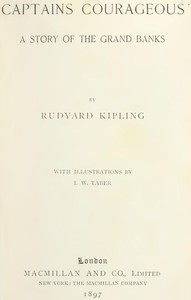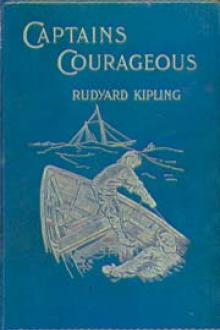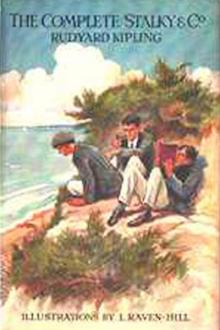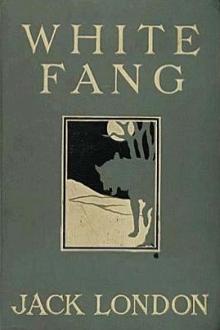"Captains Courageous": A Story of the Grand Banks by Rudyard Kipling (books for 6 year olds to read themselves txt) 📗

- Author: Rudyard Kipling
Book online «"Captains Courageous": A Story of the Grand Banks by Rudyard Kipling (books for 6 year olds to read themselves txt) 📗». Author Rudyard Kipling
"See her sayin' her piece. She's Patrick Henry naow," said Dan.
She swung sideways on a roller, and gesticulated with her jib-boom from port to starboard.
"But-ez—-fer-me, give me liberty—er give me-death!"
Wop! She sat down in the moon-path on the water, courtesying with a flourish of pride impressive enough had not the wheel-gear sniggered mockingly in its box.
Harvey laughed aloud. "Why, it's just as if she was alive," he said.
"She's as stiddy as a haouse an' as dry as a herrin'," said Dan, enthusiastically, as he was stung across the deck in a batter of spray. "Fends 'em off an 'fends 'em off, an' 'Don't ye come anigh me,' she sez. Look at her—jest look at her! Sakes! You should see one o' them toothpicks h'istin' up her anchor on her spike outer fifteen-fathom water."
"What's a toothpick, Dan?"
"Them new haddockers an' herrin'-boats. Fine's a yacht forward, with yacht sterns to 'em, an' spike bowsprits, an' a haouse that u'd take our hold. I've heard that Burgess himself he made the models fer three or four of 'em, Dad's sot ag'in' 'em on account o' their pitchin' an' joltin', but there's heaps o' money in 'em. Dad can find fish, but he ain't no ways progressive—he don't go with the march o' the times. They're chock-full o' labour-savin' jigs an' sech all. 'Ever seed the Elector o' Gloucester? She's a daisy, ef she is a toothpick."
"What do they cost, Dan?"
"Hills o' dollars. Fifteen thousand, p'haps; more, mebbe. There's gold-leaf an' everything you kin think of." Then to himself, half under his breath "Guess I'd call her Hattie S., too."
CHAPTER V
That was the first of many talks with Dan, who told Harvey why he would transfer his dory's name to the imaginary Burgess-modelled haddocker. Harvey heard a good deal about the real Hattie at Gloucester; saw a lock of her hair—which Dan, finding fair words of no avail, had "hooked" as she sat in front of him at school that winter—and a photograph. Hattie was about fourteen years old, with an awful contempt for boys, and had been trampling on Dan's heart through the winter. All this was revealed under oath of solemn secrecy on moonlit decks, in the dead dark, or in choking fog; the whining wheel behind them, the climbing deck before, and without, the unresting, clamorous sea. Once, of course, as the boys came to know each other, there was a fight, which raged from bow to stern till Penn came up and separated them, but promised not to tell Disko, who thought fighting on watch rather worse than sleeping. Harvey was no match for Dan physically, but it says a great deal for his new training that he took his defeat and did not try to get even with his conqueror by underhand methods.
That was after he had been cured of a string of boils between his elbows and wrists, where the wet jersey and oilskins cut into the flesh. The salt water stung them unpleasantly, but when they were ripe Dan treated them with Disko's razor, and assured Harvey that now he was a "blooded Banker"; the affliction of gurry-sores being the mark of the caste that claimed him.
Since he was a boy and very busy, he did not bother his head with too much thinking. He was exceedingly sorry for his mother, and often longed to see her and above all to tell her of his wonderful new life, and how brilliantly he was acquitting himself in it. Otherwise he preferred not to wonder too much how she was bearing the shock of his supposed death. But one day, as he stood on the fo'c'sle ladder, guying the cook, who had accused him and Dan of hooking fried pies, it occurred to him that this was a vast improvement on being snubbed by strangers in the smoking-room of a hired liner.
He was a recognised part of the scheme of things on the "We're Here"; had his place at the table and among the bunks; and could hold his own in the long talks on stormy days, when the others were always ready to listen to what they called his "fairy-tales" of his life ashore. It did not take him more than two days and a quarter to feel that if he spoke of his own life—it seemed very far away—no one except Dan (and even Dan's belief was sorely tried) credited him. So he invented a friend, a boy he had heard of, who drove a miniature four-pony drag in Toledo, Ohio, and ordered five suits of clothes at a time, and led things called "germans" at parties where the oldest girl was not quite fifteen, but all the presents were solid silver. Salters protested that this kind of yarn was desperately wicked, if not indeed positively blasphemous, but he listened as greedily as the others; and their criticisms at the end gave Harvey entirely new notions on "germans," clothes, cigarettes with gold-leaf tips, rings, watches, scent, small dinner-parties, champagne, card-playing, and hotel accommodation. Little by little he changed his tone when speaking of his "friend," whom Long Jack had christened "the Crazy Kid," "the Gilt-edged Baby," "the Suckin' Vanderpoop," and other pet names; and with his sea-booted feet cocked up on the table would even invent histories about silk pajamas and specially imported neckwear, to the "friend's" discredit. Harvey was a very adaptable person, with a keen eye and ear for every face and tone about him.
Before long he knew where Disko kept the old green-crusted quadrant that they called the "hog-yoke"—under the bed-bag in his bunk. When he 'took the sun, and with the help of "The Old Farmer's" almanac found the latitude, Harvey would jump down into the cabin and scratch the reckoning and date with a nail on the rust of the stove-pipe. Now, the chief engineer of the liner could have done no more, and no engineer of thirty years' service could have assumed one half of the ancient-mariner air with which Harvey, first careful to spit over the side, made public the schooner's position for that day, and then and not till then relieved Disko of the quadrant. There is an etiquette in all these things.
The said "hog-yoke," an Eldridge chart, the farming almanac, Blunt's "Coast Pilot," and Bowditch's "Navigator" were all the weapons Disko needed to guide him, except the deep-sea lead that was his spare eye. Harvey nearly slew Penn with it when Tom Platt taught him first how to "fly the blue pigeon"; and, though his strength was not equal to continuous sounding in any sort of a sea, for calm weather with a seven-pound lead on shoal water Disko used him freely. As Dan said: "'Tain't soundin's dad wants. It's samples. Grease her up good, Harve." Harvey would tallow the cup at the end, and carefully bring the sand, shell, sludge, or whatever it might be, to Disko, who fingered and smelt it and gave judgment. As has been said, when Disko thought of cod he thought as a cod; and by some long-tested mixture of instinct and





Comments (0)